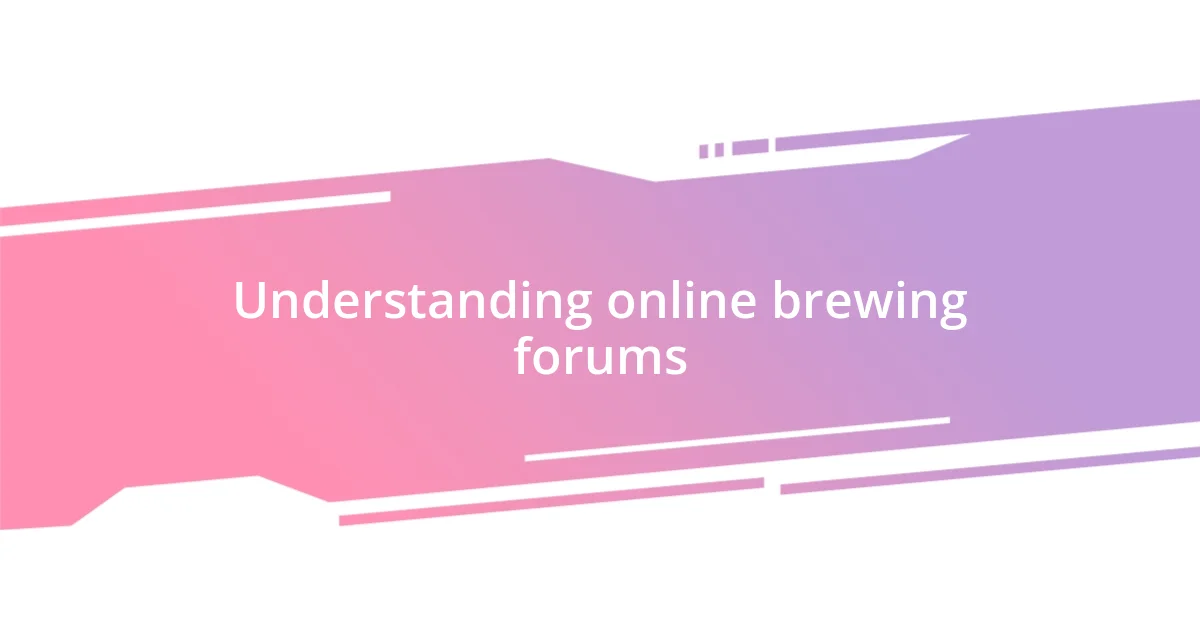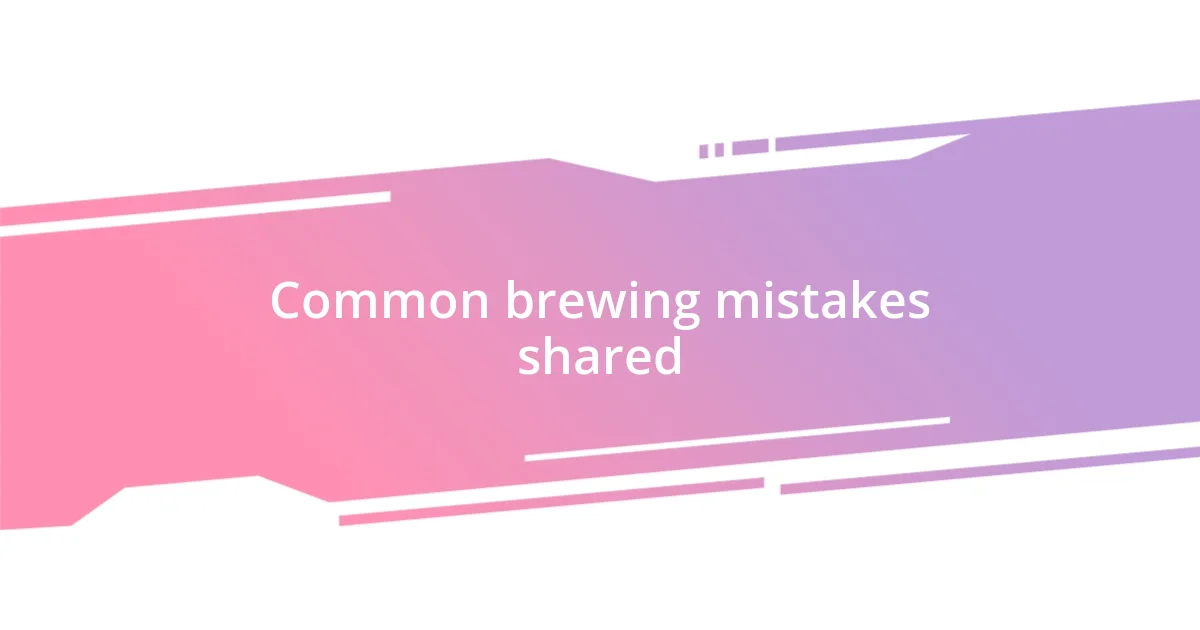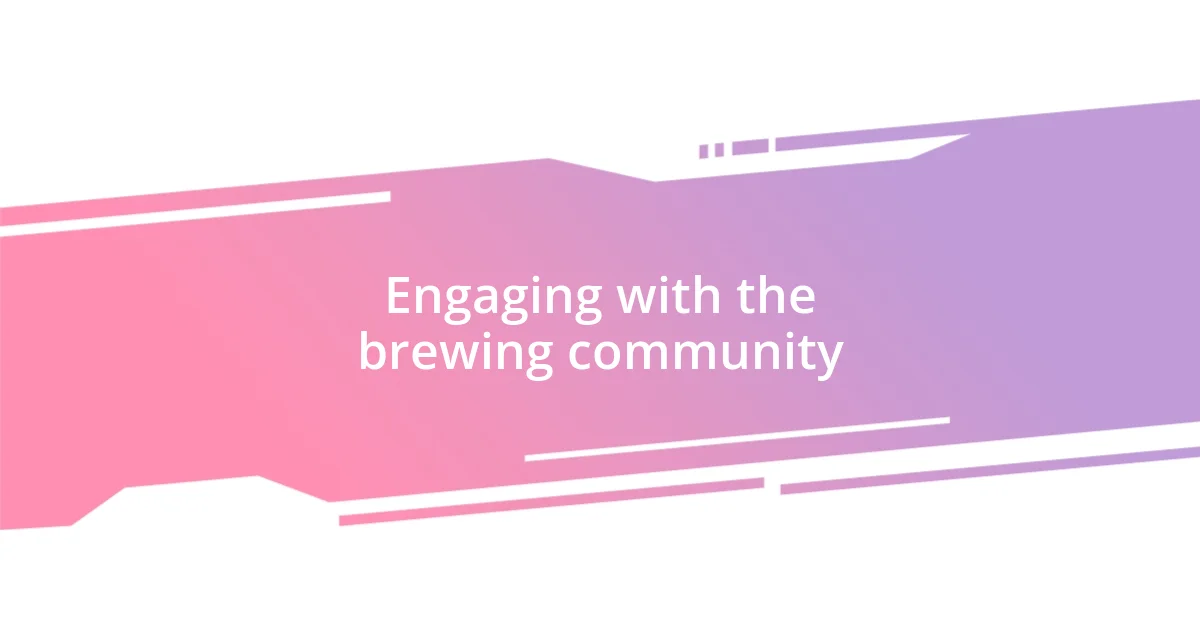Key takeaways:
- Online brewing forums foster a strong sense of community, offering support, camaraderie, and shared experiences among both novice and experienced brewers.
- Participants gain valuable insights from expert advice and continuous learning through discussions on various brewing topics such as techniques, troubleshooting, and recipe development.
- Engaging actively within the community enhances personal growth, encourages experimentation, and deepens connections, making brewing a more rewarding and enjoyable journey.

Understanding online brewing forums
Online brewing forums are a treasure trove of knowledge and camaraderie for both novice and experienced brewers. I remember the first time I stumbled upon one; it felt like opening a door to a vast world of tips, tricks, and shared experiences. Have you ever felt that rush of excitement when you find someone who has faced the same brewing challenge? It’s a unique feeling of connection that can only come from discussing a shared passion.
The diversity of topics in these forums is astounding. From questions about equipment to recipe suggestions, there’s something for everyone. I vividly recall posting a query about my first sour beer attempt. The flood of responses not only offered practical advice but showed me how passionate people can come together to help a fellow brewer succeed. Isn’t it incredible how a simple conversation can turn your brewing journey from daunting to exhilarating?
What’s more, these forums foster a sense of community that goes beyond just sharing information. I’ve seen friendships form through brewing challenges and celebrations alike. Have you ever noticed how a successful batch can spark a virtual high-five among forum members? These moments affirm the idea that brewing isn’t just about the end product; it’s also about the connections and shared experience that make the journey worthwhile.

Benefits of participating in forums
Participating in online brewing forums offers a wealth of benefits that extend beyond simply acquiring brewing knowledge. For instance, I once shared my experience with a batch that didn’t turn out as I expected. The encouragement and support I received from fellow brewers were uplifting. They not only offered solutions but shared their own struggles, creating a powerful sense of camaraderie. In those moments, I felt like I was part of a community that genuinely understood my journey.
Another advantage of these forums is the ability to tap into expert advice. When I faced a specific issue with fermentation, I searched the forum to find discussions on similar problems. The detailed explanations and personal success stories I came across were incredibly helpful. Knowing I could rely on individuals who had been there, done that, empowered me to experiment more confidently. It’s like having an entire team of brewing mentors right at my fingertips!
Furthermore, forums encourage continuous learning. Each interaction adds to my knowledge base, which keeps my passion for brewing alive. I often revisit old threads, discovering new insights that I might have missed initially. It’s fascinating how my perspective shifts with every new brewing experience, and these discussions help to refine my approach. Isn’t it amazing how even a simple suggestion can lead to a remarkable brewing adventure?
| Benefit | Description |
|---|---|
| Community Support | Connect with fellow brewers, sharing experiences and encouragement. |
| Expert Advice | Access to practical insights and solutions from experienced brewers. |
| Continuous Learning | Engage with evolving topics, enriching your brewing knowledge consistently. |

Key topics discussed in forums
The discussions in online brewing forums cover a wide array of topics that can be both informative and inspiring. I often find myself diving into threads about specific brewing techniques or rare hop varieties. There’s a certain thrill that comes from reading about someone’s experimentation with flavors I haven’t yet tried. I remember a lively debate about dry hopping practices—each brewer eager to share their successes and failures. It’s this exchange of real-world experience that makes the insights so valuable.
Key topics often discussed in brewing forums include:
- Homebrewing Techniques: Detailed practices shared, from mash efficiency to fermentation temperature control, guiding others through complex steps.
- Ingredient Selection: Conversations about the nuances of different malts, yeasts, and hops that can dramatically alter the final brew.
- Troubleshooting: Members frequently seek advice on off-flavors or unexpected issues, fostering a problem-solving atmosphere where everyone learns from challenges.
- Recipe Development: Creative exchanges surround crafting unique recipes, allowing brewers to innovate and refine their favorite brews.
- Brewing Gear: Recommendations for equipment, from budget-friendly options to high-end systems, cater to brewers at every level.
I’ve even come across discussions that delve into the history of brewing styles, tying in cultural significance and encouraging a deeper appreciation for the craft. This aspect often fuels my enthusiasm, as learning the backstory helps me embrace my own brewing journey with a sense of purpose.

Common brewing mistakes shared
Mistakes in brewing are something I’ve learned to appreciate through the shared experiences of fellow brewers. For instance, one common blunder is not paying attention to sanitation. I recall a time when I neglected to sanitize my equipment properly, and the resulting batch was nothing short of a disaster. That experience taught me that cleanliness is undeniably crucial—otherwise, you might as well invite unwanted bacteria to your brew party.
Another frequent mistake I’ve come across is temperature control during fermentation. I remember reading about someone whose beer unexpectedly turned out too fruity because of fermentation temperatures that soared too high. Their story stuck with me; it perfectly illustrated how essential it is to monitor conditions closely. After all, who wants a beer that tastes more like candy than the intended brew?
Lastly, a mistake often discussed is rushing the process—think of it as the temptation to check that pot of water boiling for pasta. I once impatiently bottled a batch before it was fully fermented, only to end up with over-carbonated bottles that spewed everywhere. Trust me; no one wants beer spraying across the kitchen! Taking your time and respecting the brewing process makes all the difference in achieving that perfect pint.

Expert tips from forum members
When it comes to expert tips from forum members, one consistent piece of advice I’ve found is the importance of keeping a brewing journal. I remember the first time I documented my process—jotting down not just the ingredients but also my thoughts and observations. It felt like a revelation as I could spot patterns in my brewing successes and failures. How could anyone brew without capturing those valuable insights? Over time, this habit turned my brewing from a hit-or-miss endeavor into a more methodical art form.
Another gem I’ve picked up is the significance of patience—an often underestimated virtue in brewing. A forum member once shared a story about waiting an extra month before bottling his beer. Initially skeptical, I decided to try it with a recent batch, and the difference was astonishing. The flavors had married beautifully, creating a depth I hadn’t achieved before. It made me think: isn’t it true that good things take time? I believe this advice is fundamental; you can taste the care and patience in every sip.
Lastly, many experienced brewers emphasize the value of community feedback. I’ve learned to share my recipes and experiences with forum members, and it’s incredibly rewarding. One time, I posted a recipe that didn’t quite hit the mark, and a seasoned brewer offered constructive tweaks that transformed it. Their insights not only improved my brew but deepened my connection to the brewing community. Isn’t it fascinating how collaboration can elevate our craft? In my experience, engaging with others adds layers of knowledge that can truly enhance your brewing skills.

How to find reliable information
To find reliable information on brewing forums, I suggest looking for posts with a mix of clear details and evidence-based insights. Whenever I come across a discussion, I always pay attention to the author’s background—do they have experience in brewing, or are they just sharing opinions? I remember finding a post from a retired brewery consultant that not only had in-depth technical knowledge but also included references to scientific studies. That level of detail reassured me I was absorbing credible info.
It also helps to check the responses in any forum thread. If other experienced brewers engage positively, sharing their knowledge and affirming the original poster’s claims, I get a sense of trustworthiness. Once, I stumbled upon a brewing technique that sounded fantastic, but the original post lacked depth. Yet, when seasoned members chimed in with their own variations and results, I realized it was worth trying. Isn’t it eye-opening how community interaction can validate information?
Lastly, I’ve learned to be skeptical of bold claims without backup. If I see anyone asserting, “This is the only way to brew a perfect IPA,” I take a moment to pause. There’s no universal method in brewing, and every expert seems to have their own secrets. I recall a time when I excitedly tried a popular technique that ended in disaster, prompting one of my mentors to remind me that brewing is as much about experimentation as it is about following rules. So, did I really learn from that credible source, or was it just hype?

Engaging with the brewing community
Engaging with the brewing community has been a game-changer for me. I remember my first real interaction in a forum; I’d posted a question about a specific yeast strain I’d been struggling with. Within hours, several users chimed in with their experiences, offering not just technical advice but also some heartfelt encouragement. It felt less like asking a question and more like a collaborative conversation where everyone was genuinely invested in helping me succeed. Isn’t it incredible how a shared passion can turn strangers into mentors?
When I actively participated in discussions, I found that my understanding of brewing deepened significantly. I vividly recall posting a simple question about hop timing, and the replies varied from technical breakdowns to creative suggestions. This back-and-forth sparked my curiosity and inspired me to experiment beyond my comfort zone. I often ponder how interaction shapes our learning curve; could it be that some of the best lessons lie in the discussions we have with fellow brewers?
There’s also a profound sense of belonging that comes with being part of the brewing community. I once attended a local meet-up after connecting with some forum members online. The thrill of discussing fermentation techniques over a pint of homebrew felt electric! Sharing our successes and challenges in person created bonds that went beyond the digital realm. It’s moments like these that remind me: aren’t we all just a little more enriched when we come together to celebrate our craft?














